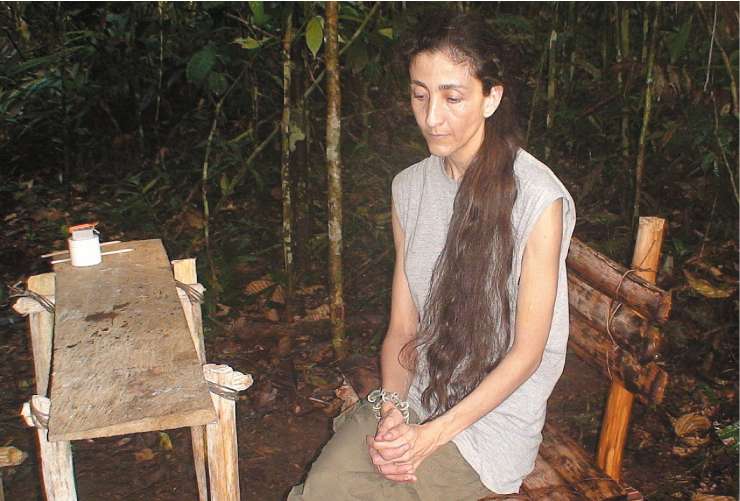'Dying Betancourt' may be freed in prisoner swap

Your support helps us to tell the story
From reproductive rights to climate change to Big Tech, The Independent is on the ground when the story is developing. Whether it's investigating the financials of Elon Musk's pro-Trump PAC or producing our latest documentary, 'The A Word', which shines a light on the American women fighting for reproductive rights, we know how important it is to parse out the facts from the messaging.
At such a critical moment in US history, we need reporters on the ground. Your donation allows us to keep sending journalists to speak to both sides of the story.
The Independent is trusted by Americans across the entire political spectrum. And unlike many other quality news outlets, we choose not to lock Americans out of our reporting and analysis with paywalls. We believe quality journalism should be available to everyone, paid for by those who can afford it.
Your support makes all the difference.Fears that Colombia's most prominent hostage may be dying in captivity have heightened following a surprise government offer of a prisoner swap meant to win her release.
In a late-night decree on Thursday, President Alvaro Uribe's government said it would immediately begin freeing jailed rebel fighters, regardless of their crime, if the Revolutionary Armed Forces of Colombia (Farc) frees Ingrid Betancourt, the Franco-Colombian former presidential candidate captured six years ago during an electoral campaign.
But her husband, Juan Carlos LeCompte, said yesterday: "I see something here that makes me very anxious and doesn't fit together." He said the government had not consulted with his family, or with the family members of other Farc prisoners, before offering the prisoner swap. "I think this is [to win over] the public opinion," he said of the government initiative, "to show they did everything possible. For me they are washing their hands of it."
Early on Thursday, the government ombudsman said he had reliable information that Ms Betancourt was suffering from hepatitis B and a tropical flesh-eating disease, and that the guerrillas had taken her to several medical outposts in a lawless region of dense jungle to the south. There has been mounting speculation that Ms Betancourt is in extremely precarious health after six years of living in remote jungle camps in wretched conditions.
There have been persistent reports in Colombia and abroad that she has become emaciated and weak, and in a letter to her mother she described death as "the sweetest of my options".
Ms Betancourt is seen as the Farc's most prized hostage in their decades-old fight against the government. The international clamour for her release also heightened in November when authorities arrested three rebel suspects and found a video of her.
Meant as proof of life, it showed Ms Betancourt, 46, sitting completely still in a clearing with her eyes cast downwards. It marked a radical departure from earlier videos where she engaged in defiant political discourse. "We cannot run the risk that Ingrid dies. We cannot run the risk that her health deteriorates," said Luis Carlos Restrepo, the peace commissioner, as he explained the government's prisoner swap proposal. He did not elaborate on any new information the government might have regarding her health.
The government decree legalises the release of jailed rebels if the Farc frees its kidnap victims. Analysts estimate about 500 Farc fighters sit in Colombian penitentiaries, while the Farc holds 40 "political prisoners", including police officers, lawmakers and three American anti-narcotics defence contractors.
Mr Restrepo called on the Farc to release Ms Betancourt first, along with any other ailing hostages. Her first husband, the French diplomat Fabrice Delloye, also said he was suspicious of the government's motives. He told Colombia's El Tiempo newspaper that the government initiative was "more of a hit meant to cause effect, than a true proposal".
Many family members of Farc hostages complain that the Colombian government is doing too little to win their freedom. Instead, they have appealed to Venezuela's leftist leader, Hugo Chavez – President Uribe's political foe – to mediate. Mr Chavez helped secure the release of six hostages earlier this year.
The recently released hostages have painted a grim picture of the conditions the kidnap victims endure in Farc hands. A former lawmaker who spent months in the same camp as Ms Betancourt described how rebels chained her to trees. He also confirmed she has attempted to escape several times.
The political analyst Alfredo Rangel said the government had left the ball in the Farc's court with the prisoner swap proposal, but he predicted the guerrilla group would continue to insist that authorities hand over a tract of demilitarised land as a condition for future releases. This condition has snagged negotiations in the past. If Ms Betancourt perishes in captivity, he added, it would be "a terrible political hit" for Latin America's oldest and largest insurgency.
Join our commenting forum
Join thought-provoking conversations, follow other Independent readers and see their replies
Comments